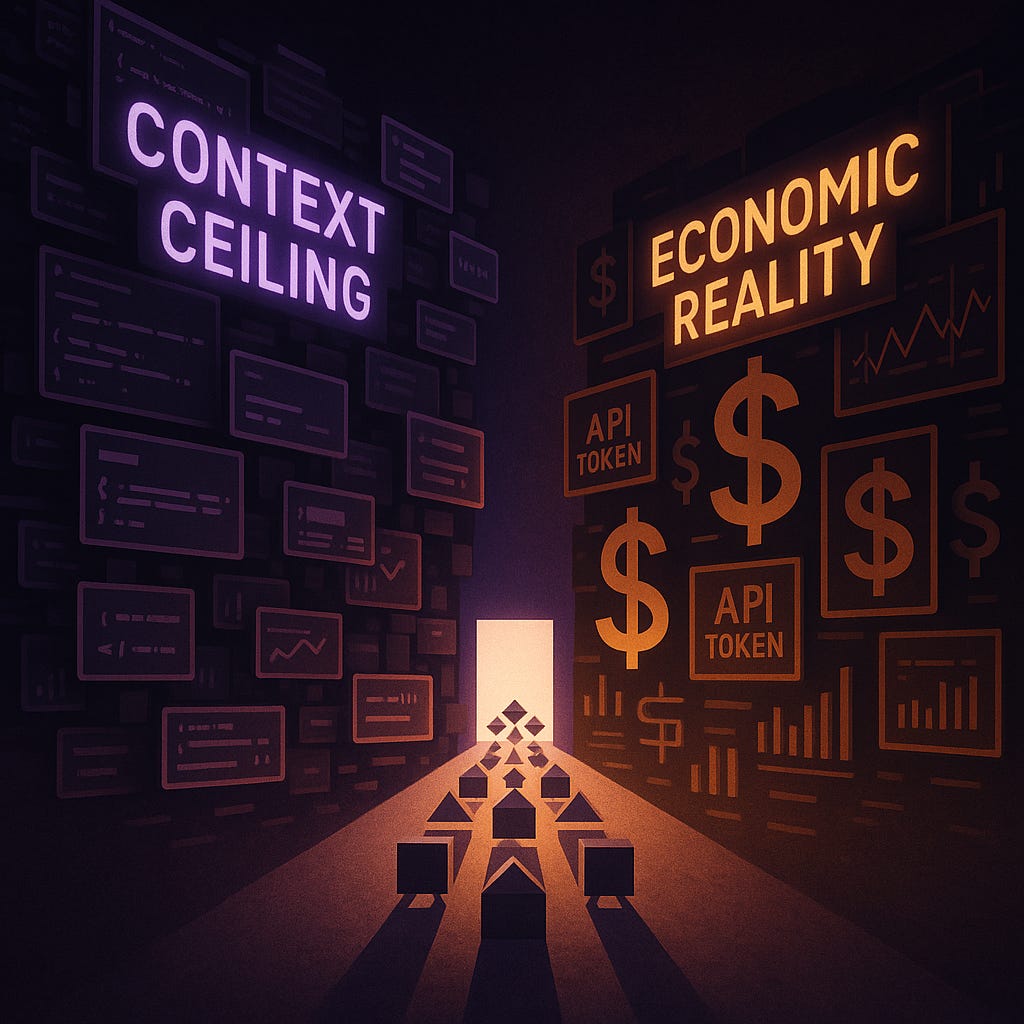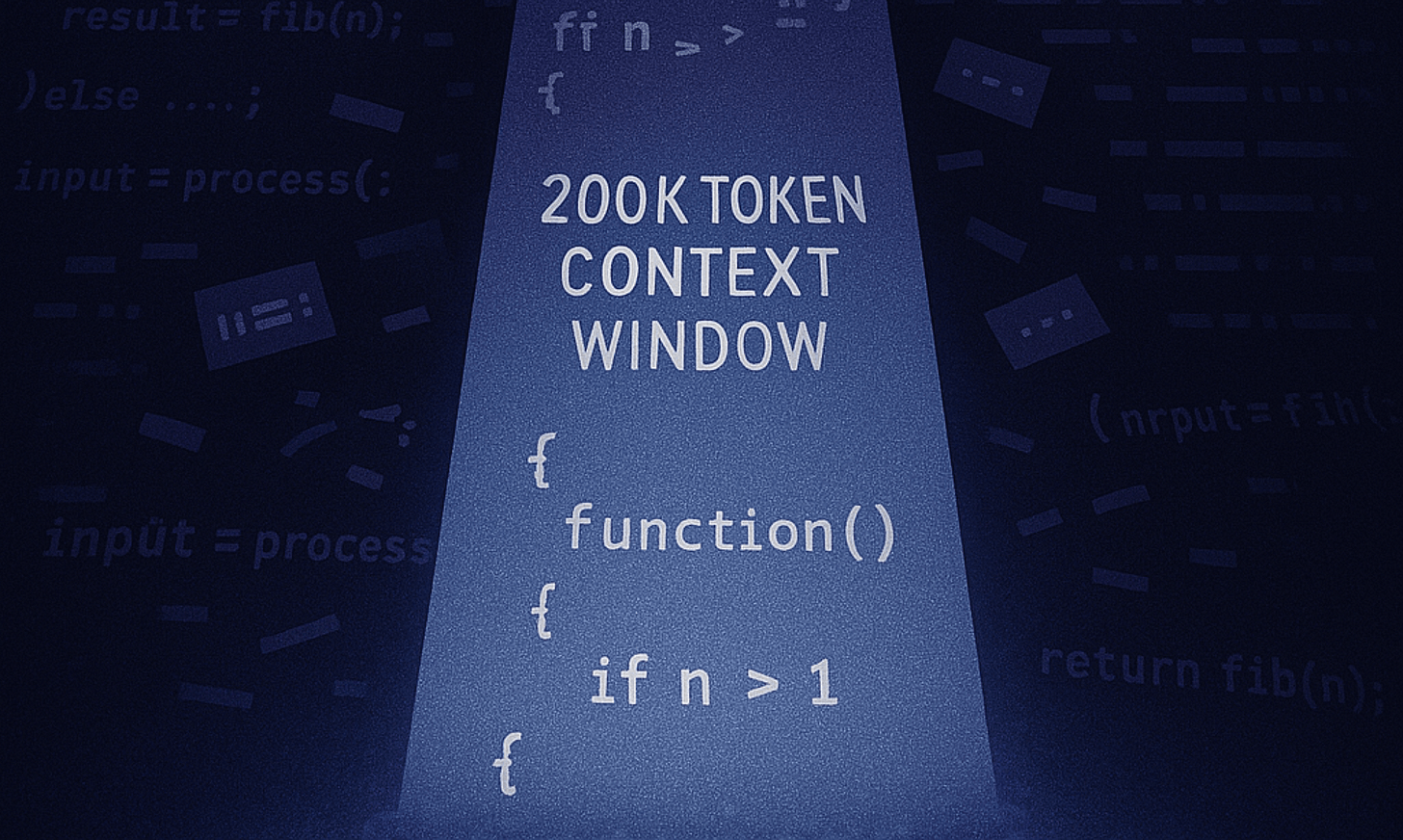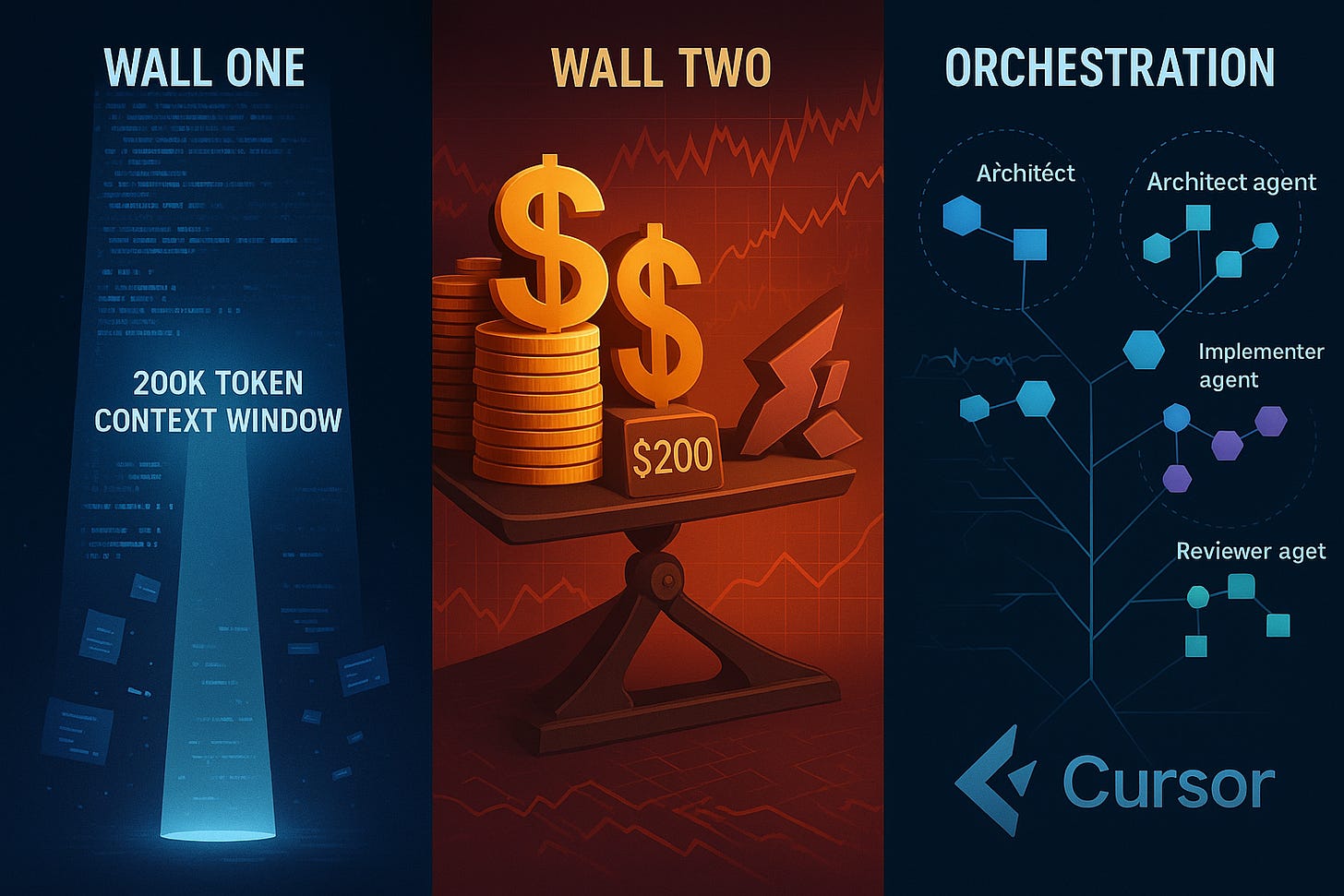Six weeks tracking developer sentiment across Reddit's major programming communities reveals something I didn't expect: the community isn't wrong about AI coding tools. They're failing for real reasons. But they're also missing what comes next.
Been analyzing 25+ high-engagement Reddit posts spanning 500+ developer comments since June. The pattern cuts two ways. Yes, current AI tools have serious problems. But the bigger issue? We're hitting two fundamental walls that make single-session coding unsustainable—even with fancy memory tricks.
And the solution is already emerging.
Wall One: The Context Ceiling
Current tools try to cram entire project context into single conversations. Even Claude's 200K token window represents maybe 50,000 lines of code. Real codebases are 500K to 5M lines. Enterprise systems are 50M+ lines.
This is where Reddit's "fancy autocomplete" critique hits hardest:
"Coding assistants are just fancy autocomplete." - u/Jugales (256 upvotes)
When defenders pushed back, the community responded brutally. Vote differential: -284 points between "revolutionary tool" and "fancy autocomplete" positions.
The highest-engagement post I tracked—1,410 upvotes—captured the downstream effect: "AI is producing very bad junior engineers." The top comment nailed what I've been seeing in client work:
"I keep seeing trivial issues cropping up in code reviews that with experience I know why it won't work but because ChatGPT spat it out and the code does 'work', the junior isn't able to discern what is wrong."
This isn't just Reddit grumbling. MIT studies back it up: students using ChatGPT for learning "remembered nothing, and they all failed" when tested without AI assistance. Those using Google search? 100% pass rates.
Here's the connection Reddit misses: junior developers aren't becoming dependent because they're lazy. They're hitting the same context walls as the tools. When AI can only see fragments of a system, it teaches fragmented thinking. When context resets every session, learning becomes episodic rather than systematic.
Memory tricks help—RAG systems, semantic search, intelligent chunking. But they're architectural band-aids. You can't understand a million-line codebase through a 200K token conversation, no matter how clever your prompt engineering.
Wall Two: Economic Reality
Remember when I predicted the other shoe would drop on AI pricing? It's dropping now.
Reddit user mattdionis burned through $2,200+ worth of API tokens while paying just $200 for Claude Max. I tracked my own usage: over 3.2 billion tokens worth $5,794 at API rates for my $200 subscription. Nearly 30x the value.
This isn't sustainable. As developers demand more sophisticated capabilities to solve real problems, tool makers realize they fundamentally mistimed market economics. AI compute is still too expensive. They can't give it away indefinitely.
The Cursor collapse in July showed what happens when economics hit reality. "Cursor: pay more, get less, and don't ask how it works" hit 757 upvotes. The backlash was so severe TechCrunch covered the crisis.
But this wasn't just about pricing changes—it was economic adjustment disguised as product updates. Cursor moved from transparent credit systems to opaque rate limits. Hidden $200 Ultra plans. Users got "locked out for hours with no explanation." Quality degradation followed inevitably. When you're burning through millions in compute costs while charging $20/month, something has to give.
Users complained about AI "forgetting half the brief" during code generation. These weren't random bugs—they were cost-cutting measures. The migration tells the story:
"If you can use anything - Claude Code has a beta plugin for IntelliJ. That would be the first thing I try... The Claude 4 models are the best for coding period." - u/TimeToSellNVDA
Developers fled to Claude Code, which has Anthropic's backing to sustain losses longer. But they're still operating within the same single-session paradigm that forces these impossible economics.
These walls reinforce each other. Context limitations force repetitive API calls. Economic pressures limit context expansion. Single-session tools hit both constraints simultaneously.
Why Current Solutions Can't Scale
The productivity data confirms what Reddit documented. DORA's 2024 report: delivery stability decreases 7.2% and throughput drops 1.5% for every 25% increase in AI adoption. McKinsey found junior developers with less than one year experience perform 7-10% slower on complex tasks when using AI tools.
Corporate pushback followed predictably. "Stop forcing AI tools on your engineers" generated 1,059 upvotes. The 2024 Stack Overflow Developer Survey captures the disconnect: AI tool usage increased from 70% to 76%, but favorability dropped from 77% to 72%. Trust stayed stagnant at 43%.
Teams spend more time debugging AI-generated code than writing from scratch. GitClear analyzed 211 million lines and found an 8-fold increase in code duplication with AI assistance. Their prediction: code churn will double by end of 2024.
The fundamental trade-off emerges: speed often comes at the cost of maintainability, security, and architectural coherence. Single-session tools can't escape this tension because they operate within the same context and economic constraints that create it.
Tool migration patterns confirm the limitations:
GitHub Copilot: Stable mediocrity with Microsoft backing but limited autonomous capabilities.
Claude Code: Rising among ex-Cursor users for quality consistency, though requiring company API access.
Windsurf: Gaining traction through transparent BYOK model among privacy-conscious developers.
Traditional IDE Extensions: Surprising trend—developers recommending return to LiveTemplates for predictable behavior without rate limits.
Each migration represents developers working around the same fundamental constraints rather than solving them.
What's Actually Coming Next
Been testing something different: orchestrated development through coordinated AI teams. Not better individual tools. Not smarter memory systems. Parallel agents that work together while staying within their context limits.
This bypasses both walls entirely:
Context problem solved: Specialized agents work within their context limits. No single agent tries to hold the entire project. Coordination happens at the workflow level, not the conversation level.
Economics problem solved: Efficient agents handle specific tasks rather than general-purpose models doing everything. Route simple tasks to cheap models, complex reasoning to expensive ones only when needed.
Early experiments show compound effects:
Parallel execution across different project areas without context pollution
Persistent project memory that survives sessions and builds institutional knowledge
Specialized agent roles where architect agents design, implementer agents build, reviewer agents validate
Systematic workflow automation that encodes best practices into reusable patterns
One client saw 164% productivity improvement using basic dual-agent coordination. Another reduced debugging time by 60% through specialized review agents. These aren't marginal improvements—they're architectural shifts.
The technical foundation is solidifying. Tools like claude-orchestrator use git worktrees for true parallel development. Claude-flow implements 17 specialized agent roles with shared memory banks. The patterns are emerging.
Most importantly, orchestration preserves human architectural control while scaling AI implementation capability. You design systems that AI teams implement. The cognitive load stays human. Context stays manageable. Economics become sustainable through efficiency rather than subsidies.
The Transition Timeline
Reddit's correction was necessary. Current single-session tools oversold their capabilities. The dependency concerns are valid. The quality issues are real. The economic model is broken.
But orchestration changes the fundamental equation. When you stop using AI tools directly and start directing AI teams, you're not learning to code with AI assistance. You're learning to architect solutions that AI teams implement.
We're 6-12 months away from mainstream orchestration adoption. The technical pieces exist. The productivity gains are documented. The solutions address every major concern Reddit raised about current AI coding tools.
Tomorrow I'll explain exactly what orchestrated development looks like in practice. Why it solves the problems Reddit identified. And how it changes the fundamental relationship between human developers and AI assistance.
The individual AI assistant era Reddit is critiquing? It's already ending. What comes next addresses every concern they raised while delivering the productivity gains the current tools promised but couldn't deliver.
The reckoning was overdue. The architecture is ready.






